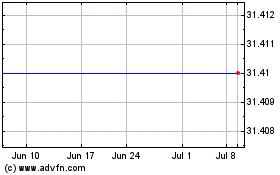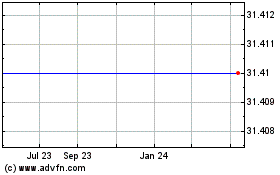SYDNEY—Rio Tinto Ltd. and its partners have lined up a combined
$4.4 billion from 20 lenders to fund the expansion of a Mongolian
copper mine, as the Anglo-Australian company continues to invest in
big, new projects despite a rout in global commodity markets.
Rio has become an outlier in the global mining industry by
spending billions of dollars to expand businesses such as bauxite
and iron ore at a time when many other large producers have delayed
new investment. A Rio-led venture plans to build a vast network of
underground tunnels at its Oyu Tolgoi deposit in Mongolia, where it
has already built an open-pit mine. It is expected to become one of
the world's largest copper operations.
An enormous minerals trove that could eventually represent up to
a third of landlocked Mongolia's economy, Oyu Tolgoi has been beset
by delays and complicated negotiations between those involved in
the venture, namely Rio, Turquoise Hill Resources Ltd. and the
Mongolian government.
Rio-controlled Turquoise Hill, a Canadian-listed miner, owns 66%
of the Oyu Tolgoi project. The Mongolian government owns the
rest.
The first convoy of trucks carrying copper to China departed
from the existing pit in July 2013 and earlier this year, a plan
was approved for an underground development after years of tense
negotiations over the sharing of costs and profits.
On Tuesday, the partnership the $4.4 billion project finance
package with 15 commercial banks and five credit agencies,
including the U.S. Export-Import Bank, for the underground
development, which could cost as much as $6 billion to build. Rio
has estimated that up to 80% of the value of the deposit—located in
the southern Gobi Desert, about 80 kilometers (50 miles) north of
the border with China—is tied to the proposed underground
operations.
The financing "is a conclusion of more than four years of
discussions with the lenders," said Jean-Sé bastien Jacques, Rio's
copper and coal chief. "We have all been on a very steep learning
curve," he said, adding that "despite a very volatile market
environment, they understand the long term value of Oyu
Tolgoi."
The news comes as other copper producers have cut output amid a
sharp slump in metal prices. Copper, which is trading at a six-year
low, has fallen by more than half since its 2011 peak of more than
$10,000 a ton, to about $4,670.
Copper is used in everything from phones to cars to plumbing,
but slower economic growth in China, the world's top commodities
buyer, has translated into sluggish demand for the metal. Miners
including Glencore PLC and Freeport McMoRan Inc. have cut
production as prices have fallen.
But Mr. Jacques said he expects copper to rebound faster than
most other commodities.
"We expect the market to recover three to four years down the
road, which is perfect timing as far as Oyu Tolgoi is concerned,"
he said. The underground mine is expected to take between five and
seven years to build.
And Oyu Tolgoi isn't the only big project that Rio is pressing
ahead with. Last month, it approved a $1.9 billion bauxite project
called Amrun in northeastern Australia. Bauxite is a raw material
that is used to make alumina, a key ingredient in the manufacturing
of aluminum.
Executives said they were eager to grow that business as well,
citing expectations of strong future demand from China, the world's
No. 1 aluminum producer.
Rio has been bruised by steep falls in commodity prices this
year, but its shares have been outperforming those of its chief
rivals. Competitors such as Anglo American PLC and Glencore have
been cutting dividends and closing mines, while Rio has vowed to
maintain payouts and invest in bold new projects.
To be sure, Rio is taking a stricter approach to spending.
Earlier this month, the company revised its 2016 budget for
major-project spending to about $5 billion from an earlier forecast
for less than $6 billion.
As recently as 2012, Rio was spending more than $17 billion a
year on major projects. The company invested billions expanding its
network of iron-ore pits and infrastructure in western Australia
during that period and has since been criticized for becoming too
reliant on the steelmaking ingredient, which now trades at its
lowest price in a decade.
When fully operational, Oyu Tolgoi is set to produce an average
of 430,000 metric tons of copper and 425,000 troy ounces of gold a
year, in addition to vast quantities of silver and molybdenum.
Rio's board still needs to approve the project. It is waiting on
necessary permits for the underground mine, as well as an internal
review of construction costs, which is currently under way. Mr.
Jacques said he expects a final decision to be made in the first
half of 2016, after which the project financing will be drawn
down.
Rio didn't disclose the interest rate that the joint venture
will pay for the loans, although it said lenders had factored in
the potential for challenges in the developing country, where
foreign investors have grappled with repeated regulatory
changes.
"The cost of the project finance is reflective of the sovereign
risk on one side—on the other, people fully factor in that it is a
'tier-one' asset," Mr. Jacques said.
Write to Rhiannon Hoyle at rhiannon.hoyle@wsj.com
(END) Dow Jones Newswires
December 15, 2015 02:45 ET (07:45 GMT)
Copyright (c) 2015 Dow Jones & Company, Inc.
Turquoise Hill Resources (NYSE:TRQ)
Historical Stock Chart
From Mar 2024 to Apr 2024

Turquoise Hill Resources (NYSE:TRQ)
Historical Stock Chart
From Apr 2023 to Apr 2024
